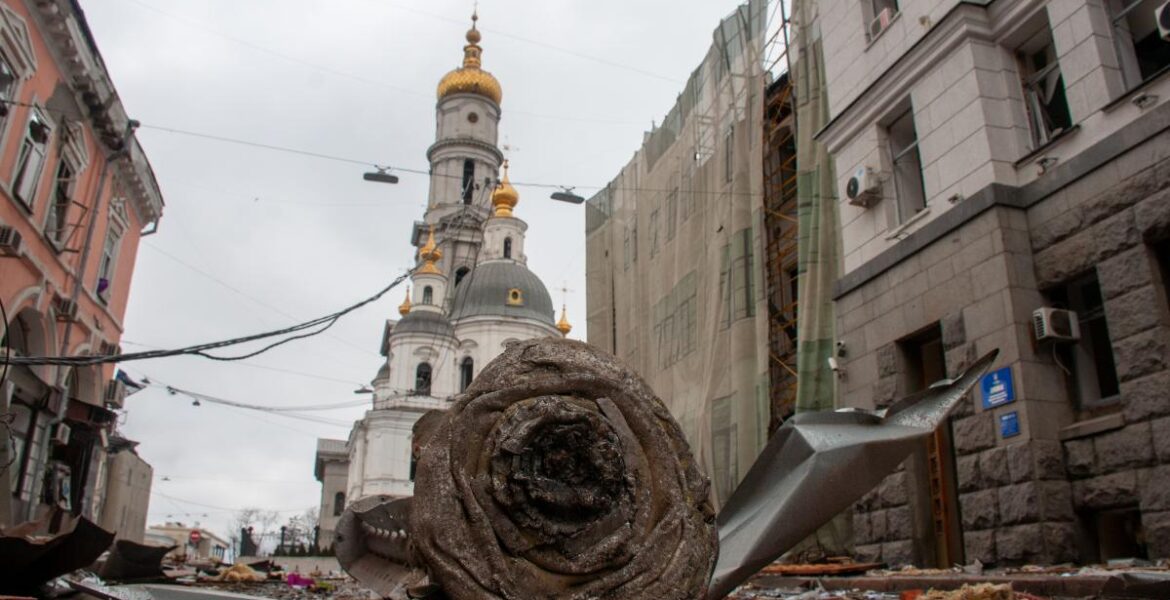Kharkiv after bombardment by Russia / photo by UNIAN (Andriy Mariienko)
The city of Kharkiv, situated near the border with Russia, has become a focal point of Russian aggression in Ukraine. In March of this year, Russian President Putin introduced the term “sanitary zone” in reference to the border area of the Kharkiv region. This term, typically used for areas rendered uninhabitable due to disasters, hints at Russia’s intention to make Kharkiv unlivable, facilitating a genocidal agenda against its peaceful inhabitants. Unable to seize Kharkiv through conventional military means, Russia now seeks to destabilise the city through relentless bombings, rendering life impossible and forcing people to evacuate.
Russian occupation forces launch daily attacks on Kharkiv and its surrounding regions, employing guided aerial bombs, drones, and other weaponry. The objective is clear: to transform the vibrant city into a desolate wasteland, unfit for human habitation. Kharkiv and its environs have borne the brunt of Russian aggression, suffering significant damage to vital infrastructure, including energy facilities and transformer substations. The destruction has resulted in a severe energy crisis, with prolonged power outages lasting up to 12 hours.
The bombardment of Kharkiv’s infrastructure aims at instilling panic and doubt in Ukraine’s ability to defend itself. By targeting energy and other critical infrastructure, Russia seeks to provoke chaos and undermine confidence in the Ukrainian government’s ability to protect its citizens. The strategic significance of Kharkiv, often referred to as the “second capital” of Ukraine, is not lost on the Kremlin. Moreover, Russia harbours a desire for vengeance following its failure to capture Kharkiv in 2022, further fueling its aggression towards the city.
Kharkiv’s proximity to the Russian border grants Russia easy access to artillery, rocket systems, drones, and guided aviation bombs. This proximity allows Russian forces to bombard the city with impunity, further exacerbating the humanitarian crisis unfolding in the region. Despite the relentless attacks, over a million resilient residents remain in Kharkiv, defiant in the face of adversity.
The situation in Kharkiv demands urgent international attention and condemnation. The deliberate targeting of civilian infrastructure and populations constitutes a gross violation of international law and human rights. The international community must stand in solidarity with Ukraine, denouncing Russia’s aggression and providing assistance to alleviate the suffering of Kharkiv’s residents.
The transfer of additional Patriot missile defence systems to Ukraine is paramount in this regard. While Ukraine has received some support in the form of these systems, it is glaringly insufficient given the scale of the threat it faces. The Patriot systems, proven to be effective in intercepting ballistic missiles, represent a critical lifeline for Ukrainian civilians living under constant threat.
Investing in missile defence systems not only saves lives but also prevents the further destruction of Ukrainian cities, thus alleviating the burden of post-war reconstruction. By bolstering Ukraine’s defence capabilities, the international community can help prevent further loss of life and contribute to the preservation of peace and stability in the region.
Failure to act decisively risks prolonging the conflict and escalating the humanitarian crisis in Ukraine. Concerted efforts must be made to halt Russian aggression and restore peace and stability to the region.




